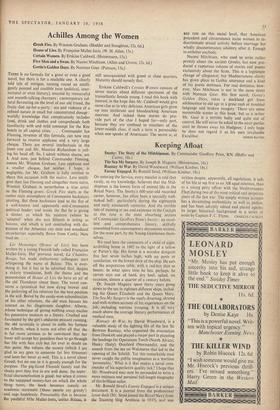Achilles Among the Women
THERE is no formula for a great or even a good novel, but there is for a readable one. A clearly told tale of intrigue, turning round an intelli- gently pointed and credible issue (political, inter- national or even literary), enacted by resourceful and smooth-talking charmers : contemporary cul- tural flavouring on the level of our old, friend, the fruity don up-for-a-party : sex and violence of a refined nature in small but concentrated dosage : worldly knowledge that conspicuously includes food, drink and clothes and comprehends both familiarity with and mild contempt for the Ritz hotels in all capital cities. . . . Commander Ian Fleming, .inventor of this formula, can now step forward to receive applause and a very large cheque. There are several intellectuals in the front row and Mr. Maurice Richardson is yell- ing his head off. So, I admit without shame, am I. And now, just behind Commander Fleming, comes Mr. Winston Graham. Less applause and a smaller cheque, but neither, I hope, is negligible, for Mr. Graham is fully entitled to share this occasion with the maitre. Less intelli- gent than Ian Fleming and altogether more naïve, Winston Graham is nevertheless a true artist in the Fleming genre. Greek Fire starts in the . rather stale atmosphere of Communist backstairs plotting. But these backstairs lead to the flat of a well-known and apparently anti-Communist political leader; and inside the flat he is giving a dinner, at which his mistress (whom he 'adopted' when she was fifteen) is acting as hostess, and which is just coneluding with dis- cussion of the Athenian city state and woodland strawberries especially flown from Corfu. Now read on. .
Les Mensonges (House of Lies) has been Written by 'a young Flemish lady called Francoise Mallet-ions. Her previous novel, La Chambre Rouge, has made enthusiastic colleagues start whispering the name of Balzac. This is over- doing it; but it has to be admitted that, despite a rickety translation, both the theme and the presentation of House of Lies do have an air of the old Thunderer about them. The novel con- cerns a tyrannical but now dying brewer and the jockeying of his relatives for the best position in the will. Bored by the easily-won subordination of his other relations, the old man focuses his interest on his illegitimate daughter, Alberte, whose technique of giving nothing away excites his possessive instincts to a frenzy. Crushed and fascinated by the girl's obdurate peasant cunning, the old tarantula is about to settle his fortune on Alberte, when it turns out after all that she is far more anxious to be convinced that her lover will accept her penniless than to go through her life with him rich but for ever in doubt on this point. She refuses the money (which I am glad to say goes to someone far less tiresome) and loses her lover as well. This is a novel about Greed; but no one in it is greedy enough for the purpose. The pig-faced Flemish family and the sleazy port they live in are well done; the super- ficial characterisation is good; but when it comes to the supposed money-lust on which the whole thing turns, the book becomes merely an academic statement ('these people are greedy') and sags hopelessly. Presumably this is because the youthful Mlle Mallet-ions, unlike .Balzac, is
still unacquainted with greed at close quarters. Maturity should remedy that.
Erskine Caldwell's Certain Women consists of Seven stories about different specimens of the transatlantic female young. I read this book with interest, in the hope that Mr. Caldwell would give some clue as to why delicious American girls grow up into intolerant and bloodsucking American matrons. And indeed these stories do pro- vide part of the clue I hoped for—only part, because they are confined to members of the lower-middle class, if such a term is permissible when one•speaks of Americans. The secret is, at
any rate on this social level, that American precedent and circumstance incite women to in- discriminate sexual activity before marriage but wholly discountenance adultery after it. Enough to embitter anybody.
Naomi Mitchison, who used to write rather prettily about the ancient Greeks, has now pro- duced a rapturous volume of stories and poems exclusively about the Scots. This is a legitimate change of allegiance; but Mediterranean clarity has given place to Gothic utterance and a kind of fey poetic dottiness. For real dottiness, how- ever, 'Miss Mitchison is not in the same street with' Norman Gear. His first novel, Genie's Golden Days, takes a dockland girl from adolescence to old age in a great rush of troubled language and broken imagery. There are some memorable scenes in this book, but as a writer . Mr. Gear is a,, terrible bully and quite out of control. He will never be asked to the nicer parties until he throws away his bludgeon; I only hope he does not regard it as his own invaluable


































 Previous page
Previous page